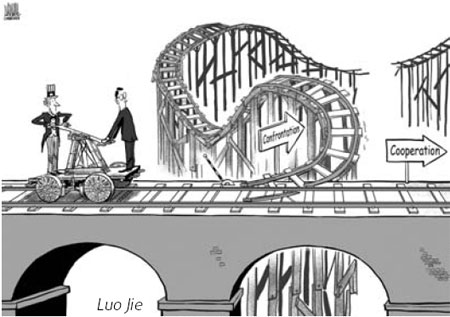Receiving 5 Free Baseball Tickets Constitutes Bribery—American Law’s Gaping Distance from Human Nature
We still have not seen irrefutable evidence that Governor Patterson abused his position. It is only because the Yankees require government support that there is a ring of corruption. In our perspective, there are two questions that should hamper the prosecution. First, although he has not been proven guilty, why is he being punished severely? Secondly, the total price for those five tickets was only $2,125, and the governor was not the only one going to use those tickets (there would have been at least two assistants, say)—isn’t punishing him like this a bit excessive?
As for the question of appropriate punishment, we’ve been subject to the static of superfluous public opinion. A bigger question we should be asking ourselves is: when dealing with the supervision of public officials, do we really need iron-clad evidence?
It so happens that there is a similar case in Hong Kong. On December 8th, after two years time and 17 million HKD, a special investigation has concluded. The investigation stated that the previous administration’s director of Housing and Property Management, Liang Zhanwen, after more than a year of retirement, received a hefty reemployment bonus. This case—of receiving such a high reemployment bonus—was examined and has proved that there was a loophole in the system (originally reported in Jinghua Times on December 17). Ordinarily, Liang Zhanwen would have been following appropriate procedure when he received the bonus. He was approved by the appropriate department when he applied for the reemployment according to the law. Despite this, the case has been unable to escape intense public criticism. When Liang Zhanwen acted as the Permanent Standing Secretary of Housing and Property Management, he once sold a building site at a below-market price to his reemployment boss. In the eyes of the public, it looks as if that boss, by giving Liang a contract, was throwing him a bone of thanks—but who can really say there was or wasn’t any backroom dealings?
We are certainly not strangers to these kinds of things. And after establishing the criteria for human rights we have, by contrast, had a clear way of defining corruption. We learned absolute power corrupts absolutely. Although in the last two years we have seen how much money was consumed in investigating Liang, we have yet to see clearly what the relationship between Liang and the contract boss was. Despite the fact that we’ve seen nothing beyond Liang’s garnering a bonus being exposed, the SAR Public Affairs Bureau Chief Yu Zongyi still has to apologize for this. Donald Tsang Yam-kuen also expressed a need to tighten supervision of officials. The report from the legislative council is unwilling to forgive or pardon Liang. They sided with the high court’s examination and condemned Liang and the other officials involved.
Looking at the cases of Governor Patterson and Liang it is not hard to see the supervisory departments did not find concrete proof in either case of abuse of public office. But all would agree, there is no way to truly prove their innocence or unlawful abuse of benefits—the existence of ‘questionable corruption.’ This is the real reason for the harsh punishment of Patterson and Liang. It can also be understood like this—even if there was a perfect system to monitor officials, there will always be some gap or loophole. Those who control power have the responsibility to demonstrate to the public that there are checks and balances of power; that the circulation of power will always be subject to rule of law.
This author feels that, in our own society, there are certainly instances of suspected corruption—cases very similar to Patterson’s, where officials have received tickets or valuable gift cards. We also have cases like Liang's, where power has corrupted people. For the former case, what stands out most is not that the supervisory mechanism has not been thorough; it’s that things appear to lack this difficult-to-define quality of ‘governing honestly.’ We need to call for and support high officials handing themselves over, and support them when they speak openly and honestly. In the latter case, there are those who use the excuse that the law is insufficient to prove their wrongdoing. They say—it’s not that I have not been a good leader; it’s that the government has no basis to make this judgment.
Ever since Lu Sun, we have deeply understood the value of using certain aspects of foreign culture. The saying goes that the master shows you the way to the door, but correcting one’s behavior rests with the individual. As for how to deal with behavior that is suspiciously corrupt, we only have to study more closely the cases of Patterson and Liang, we don’t need more talk.

